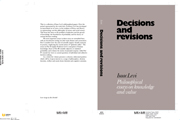Book contents
- Frontmatter
- Contents
- Preface
- PART I Cognitive decision making
- PART II Knowledge and ignorance
- PART III Chance and surprise
- 12 Subjunctives, dispositions and chances
- 13 Direct inference
- 14 Potential surprise: its role in inference and decision making
- PART IV Decision making
- Bibliography of Isaac Levi
- Bibliography
- Index of names
- Index of subjects
14 - Potential surprise: its role in inference and decision making
Published online by Cambridge University Press: 26 March 2010
- Frontmatter
- Contents
- Preface
- PART I Cognitive decision making
- PART II Knowledge and ignorance
- PART III Chance and surprise
- 12 Subjunctives, dispositions and chances
- 13 Direct inference
- 14 Potential surprise: its role in inference and decision making
- PART IV Decision making
- Bibliography of Isaac Levi
- Bibliography
- Index of names
- Index of subjects
Summary
G. L. S. Shackle published Expectation in Economics in 1949. That essay introduces potential surprise in determining the expectations controlling decision making in general and the decisions of investors and other agents in the market place in particular.
In this paper, I shall attempt to do the following:
(i) Reformulate an account of Shackle's theory of potential surprise along lines similar to those I first followed in 1966.
(ii) Explain the application of this account of potential surprise I suggested in (Levi, 1967<2, chs. VIII and IX).
(iii) Outline Shackle's decision theory and the role of potential surprise in that theory and evaluate Shackle's theory from the vantage point of the decision theory I favor.
(iv) Compare Shackle's theory of potential surprise with L. J. Cohen's measures of inductive support and inductive probability (Cohen, 1970 and 1977) and G. Shafer's belief and support functions (Shafer, 1976).
My aim will be to show that Shackle's ideas merit serious attention from philosophers but that the domain of application of greatest interest is not the one he intended.
Credal states
At time t, I suppose that ideally situated agent X is in a cognitive state representable by a corpus of knowledgeKx,t and a credal state Bx,t.
Information
- Type
- Chapter
- Information
- Decisions and RevisionsPhilosophical Essays on Knowledge and Value, pp. 214 - 242Publisher: Cambridge University PressPrint publication year: 1984
Accessibility standard: Unknown
Why this information is here
This section outlines the accessibility features of this content - including support for screen readers, full keyboard navigation and high-contrast display options. This may not be relevant for you.Accessibility Information
- 1
- Cited by
